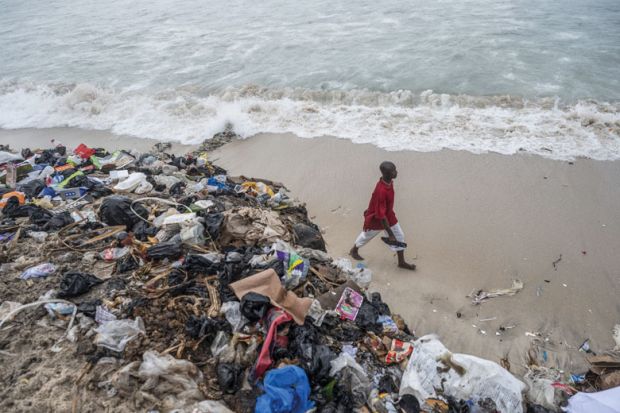Founded to address Africa’s need for ethical leaders, a revolutionary Ghanaian university is now turning its attention to a series of other monumental challenges, including artificial intelligence and climate change.
Ashesi University, a private, not-for-profit institution near Accra, was founded by Patrick Awuah in 2002 to raise the quality of higher education on the continent, with his achievements being recognised with the award of the World Innovation Summit for Education (Wise) prize in 2017.
Six years after winning the prestigious honour, Mr Awuah returned to Qatar for the Wise Summit, where he told Times Higher Education of his institution’s new strategic plan to focus on some of the big challenges facing Africa – the fourth industrial revolution, demographic shifts, issues around health, and climate change.
“We’re going to infuse climate throughout the curriculum the same way we’ve done with ethics,” he said.
“It doesn’t matter if you’re studying business, or engineering or economics; you’re still getting appropriate climate content for the discipline you’re studying, so students who come out will have a clear understanding of the issue, but also an understanding of how their discipline matters and how they engage with the issue.
“It’s a big issue and we should all be engaged with it, and we certainly think all our students should be and all the faculties should be.”
Mr Awuah, who founded Ashesi after returning from studying and working in the US, said all institutions should be doing likewise, although African universities perhaps had a greater need.
“Africa’s responsible for less than 4 per cent of greenhouse gases, but Africa is going to be severely affected,” he said.
“There’s going to be a lot of stresses, so the question of adaptation is going to be critically important. But also if you look at the demographic growth and Africa’s desire to grow economically, we should not be repeating the mistakes of other places; we should not be adding to the problem, so mitigation is important.”
Ashesi, which began in a rented house with an inaugural class of 30 students, was recently named in the top 10 of THE’s inaugural Sub-Saharan Africa University Rankings.
Research has shown that Africa’s population is set to double by 2050, posing serious challenges for the country’s higher education sector in educating the workforce.
Demographics is thus another challenge that Ashesi is hoping to help with – both by expanding and by means of collaborations. It set up the Education Collaborative, which involves faculty and leadership from more than 400 universities, to cope with the scale and speed needed.
“No one university can tackle the problem, but we can if we work collaboratively together,” said Mr Awuah, a graduate of Swarthmore College and the University of California, Berkeley, and a former Microsoft employee.
“If we can get a sea change, with universities working with each other and learning from each other, I think we can address this issue.”
Ashesi has also been examining how it can use artificial intelligence to improve efficiency, and challenging its faculty to think about how they approach it.
Mr Awuah said the technology had rightly captured everyone’s attention this year, but told delegates at Wise that his daughter had warned him not to “overhype” ChatGPT.
“We shouldn’t treat AI as something that is going to solve all our problems or wreck the economy and put us all out of jobs,” he said.
“It’s not going to be either of those two things – it’s going to be something in the middle.”
As part of its focus on health, Ashesi has recently launched a training programme partnership with the World Health Organization to improve healthcare outcomes in Ghana.
This continued innovation is very much a part of the university’s DNA, which broke the mould in the country in seeking to produce a new generation of African leaders.
“We are educating people who are going to be leaders in our society, so we have to be very intentional in educating the people who have good character, who are going to be innovative, who are going to add value to their countries,” said Mr Awuah.
But the hope was always that others would follow. “It was a theory of change – that if we enter and do something different and disruptive others would pay attention to, they would start to make changes. It was a hope that this would occur,” he said.
Mr Awuah said accreditors in Ghana were initially resistant to this approach, but the university was eventually able to convince them to “let us try something different”.
Ashesi used to be alone in Ghana in teaching a core curriculum to educate its students more broadly, but now all universities are asked if they have a general studies programme. While some public universities might be now following suit, Mr Awuah said, Ashesi still remained unique.
“The career placement of our students is dramatically different from other universities,” he said.
“That has made a very pointed statement to other universities that this is what the corporate world and the public sector want in university graduates, and I think that’s a very big impact.”

